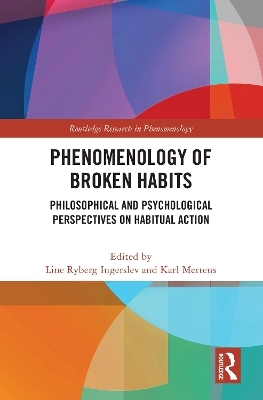
Phenomenology of Broken Habits
Routledge (Verlag)
978-1-032-36527-5 (ISBN)
The chapters in this volume investigate the epistemic and existential relevance of breakdown of habits and the corresponding kinds of self-understanding available to the agent. The first part focuses on the double-sidedness of habitual life. On the one hand, habits allow us to arrange and navigate in a familiar home world; on the other hand, habits can take hold of us in such a way that we lose our sense of autonomy. The contributors argue that habitual agency is structurally carried by a dynamic that entails both freedom and necessity. As habits enable us to inhabit and thus acquire a world, they also affectively provide a texture and a background for our feeling at home in the world. The chapters in Part 2 focus on the breakdowns of our habitual social and technological life forms and the phenomenology of their affective texture. History and habitual learning are sedimented in our body memory and in our language, and these sedimented layers are partly out of our direct control. Part 3 focuses on the structural openness of habits in relating to one’s past and one’s traumatic experiences. Part 4 reflects on the ways in which we might become aware of and thus transform or appropriate our culturally given habits.
Phenomenology of Broken Habits will appeal to researchers and advanced students working in phenomenology, philosophy of mind, and philosophy of psychology.
Line Ryberg Ingerslev is a postdoctoral research fellow at the Center for Subjectivity Research, University of Copenhagen, Denmark. She works on weaker forms of agency, enduring we-identities and collective memory. Karl Mertens is Professor in Philosophy and holds the Chair for Practical Philosophy at the Julius-Maximilian University, Würzburg. Mertens specializes in questions of normativity, agency, and the phenomenology of action.
Introduction: The Epistemic Relevance of Broken Habits Line Ryberg Ingerslev and Karl Mertens Part 1: The Double-Sidedness of Habit 1. Me, My (Habitual) Self, and I: A Phenomenological Account of Habitual Identity Maren Wehrle 2. The Eidetic Phenomenology of Habits According to Paul Ricœur Luz Ascarate 3. Ideal and Real Habits after Husserl Emanuele Caminada 4. Intentionality and the Power of Habit Johannes S. Hewig Part 2: Social and Technological Disruptions of Habitual Life Forms 5. Social Habits and their Breakdowns Nick Crossley 6. Are You Gaslighting Me? The Role of Affective Habits in Epistemic Friction Ditte Marie Munch-Jurisic 7. Smart Worlds and Broken Habits: A Contextual Analysis of the Technological Relations of Post-phenomenology Maria Brincker Part 3: Transformative Experiences and the Possibility of New Habits. De-habituation and Re-habituation 8. Playing for Life: The Vital Need of Retaining the Plasticity of Habituation Kirsten Jacobson 9. Habitual Identity and Transformative Experience in Merleau-Ponty Jacub Čapek 10. A Melancholic Joy: On the Role Habits Play in Nostalgia Dylan Trigg 11. It Goes With(out) Saying: The Disruptive Habit of Speaking Dorothée Legrand Part 4: Cultural Ruptures of Habitual Life 12. Habits and (Un)Familiarity: A Political Phenomenology of the “I can” and the “I cannot” Gerhard Thonhauser 13. Intercultural Encounters and Culture Shock: An Anthropological Systematisation of Forms and Dynamics Christoph Antweiler 14. Habits in Exile: A Genetic Phenomenology of Exile Displacement Marco Cavallaro 15. Habits and Bones Roland Breeur
| Erscheinungsdatum | 13.06.2024 |
|---|---|
| Reihe/Serie | Routledge Research in Phenomenology |
| Zusatzinfo | 3 Line drawings, black and white; 2 Halftones, black and white; 5 Illustrations, black and white |
| Verlagsort | London |
| Sprache | englisch |
| Maße | 152 x 229 mm |
| Gewicht | 762 g |
| Themenwelt | Geisteswissenschaften ► Philosophie |
| Geisteswissenschaften ► Psychologie ► Allgemeine Psychologie | |
| ISBN-10 | 1-032-36527-7 / 1032365277 |
| ISBN-13 | 978-1-032-36527-5 / 9781032365275 |
| Zustand | Neuware |
| Haben Sie eine Frage zum Produkt? |
aus dem Bereich


